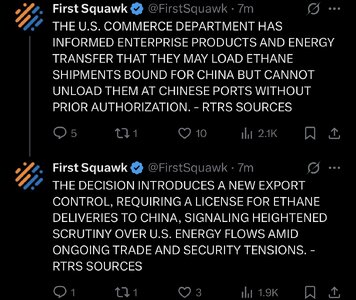Navigation
Install the app
How to install the app on iOS
Follow along with the video below to see how to install our site as a web app on your home screen.
Note: This feature may not be available in some browsers.
More options
You are using an out of date browser. It may not display this or other websites correctly.
You should upgrade or use an alternative browser.
You should upgrade or use an alternative browser.
Tariffs Catch-All
- Thread starter BubbaOtis
- Start date
- Replies: 5K
- Views: 178K
- Politics
- Messages
- 8,287
Trump responce: stop crying kid you already have A doll. Don't you know there are billionaires that need tax breaks.
- Messages
- 8,287
Mob boss mentality.
- Messages
- 8,287
And why is it needed?Almost no one in NATO will increase defense spending to 5% of GDP. It’s taken years and years to get 23 nations to 2% or higher. Poland is above 4% - that’s it.
We spend enough for everyone.
I guess trump wants everyone to spend more buying US weapons.
He likely does think an increase in defense spending will result in sales of American weaponry, ammunition, and equipment. He’s that stupid. He’s spent months pissing all over Europe.And why is it needed?
We spend enough for everyone.
I guess trump wants everyone to spend more buying US weapons.
I see Europe buying European products because they don’t see the US as a reliable ally.
- Messages
- 41,444
The deal is actually 3.5% on defense and 1.5% on defense-related infrastructure … it was a compromise from Trump’s demand for 4% on defense across the board (and reflects essentially the status quo in U.S. spending now).Almost no one in NATO will increase defense spending to 5% of GDP. It’s taken years and years to get 23 nations to 2% or higher. Poland is above 4% - that’s it.
- Messages
- 1,948
But he’ll claim that they are. And the other nations are smart enough to not dispute it because they understand all they need to do is allow Trump to announce the deal without actually following through on it.Almost no one in NATO will increase defense spending to 5% of GDP. It’s taken years and years to get 23 nations to 2% or higher. Poland is above 4% - that’s it.
superrific
Master of the ZZLverse
- Messages
- 12,415
Not sure you're right. The Europeans are looking for ways to jump start technology and manufacturing -- especially Germany. Germany, of course, was not allowed to have a military-industrial complex after WWII. They aren't increasing it because Trump tells them to; but they might be increasing it as industrial policy.Almost no one in NATO will increase defense spending to 5% of GDP. It’s taken years and years to get 23 nations to 2% or higher. Poland is above 4% - that’s it.
Super, you could be correct.
I expect the NATO nations themselves will have trouble increasing defense spending much. Increasing defense spending will mean cutting elsewhere. Those cuts will be unpopular.
All but 6 NATO nations (Poland - 4.12, Estonia - 3.43, USA - 3.38, Latvia - 3.15, Greece - 3.08, Lithuania - 2.85) spend less than 2.5% of GDP on defense. Four of the nations that spend the highest percentage either border Russia or are damn close to it AND remember decades of Soviet rule. Finland is 7th at 2.41%.
Getting a majority of NATO nations to 3% will be nigh on impossible. 4%? 5% is laughable.
The UK spends 2.33; Germany spends 2.12.
Doesn’t Germany have an industrial policy?
Doesn’t it have highly competent defense companies (Leopard tanks, Puma armored vehicles, Heckler & Koch small arms, ammunition manufacturers, cruise missile programs and production)? It doesn’t have anything major in terms of helicopters or fighters/bombers.
Does an industrial policy based on defense spending produce net gains? All those munitions used during training or war are gone.
I expect the NATO nations themselves will have trouble increasing defense spending much. Increasing defense spending will mean cutting elsewhere. Those cuts will be unpopular.
All but 6 NATO nations (Poland - 4.12, Estonia - 3.43, USA - 3.38, Latvia - 3.15, Greece - 3.08, Lithuania - 2.85) spend less than 2.5% of GDP on defense. Four of the nations that spend the highest percentage either border Russia or are damn close to it AND remember decades of Soviet rule. Finland is 7th at 2.41%.
Getting a majority of NATO nations to 3% will be nigh on impossible. 4%? 5% is laughable.
The UK spends 2.33; Germany spends 2.12.
Doesn’t Germany have an industrial policy?
Doesn’t it have highly competent defense companies (Leopard tanks, Puma armored vehicles, Heckler & Koch small arms, ammunition manufacturers, cruise missile programs and production)? It doesn’t have anything major in terms of helicopters or fighters/bombers.
Does an industrial policy based on defense spending produce net gains? All those munitions used during training or war are gone.
superrific
Master of the ZZLverse
- Messages
- 12,415
German leaders seem to think that military spending is a key to modernizing the economy. I don't know how true that is, but it seems as though German officials across the board have said as much. I don't know if defense spending produces net gains, but the Germans seem to think it does.Super, you could be correct.
I expect the NATO nations themselves will have trouble increasing defense spending much. Increasing defense spending will mean cutting elsewhere. Those cuts will be unpopular.
All but 6 NATO nations (Poland - 4.12, Estonia - 3.43, USA - 3.38, Latvia - 3.15, Greece - 3.08, Lithuania - 2.85) spend less than 2.5% of GDP on defense. Four of the nations that spend the highest percentage either border Russia or are damn close to it AND remember decades of Soviet rule. Finland is 7th at 2.41%.
Getting a majority of NATO nations to 3% will be nigh on impossible. 4%? 5% is laughable.
The UK spends 2.33; Germany spends 2.12.
Doesn’t Germany have an industrial policy?
Doesn’t it have highly competent defense companies (Leopard tanks, Puma armored vehicles, Heckler & Koch small arms, ammunition manufacturers, cruise missile programs and production)? It doesn’t have anything major in terms of helicopters or fighters/bombers.
Does an industrial policy based on defense spending produce net gains? All those munitions used during training or war are gone.
If Germans think it produces net gains, why is Germany’s defense spending at 2.12% of GDP (15th in NATO)?German leaders seem to think that military spending is a key to modernizing the economy. I don't know how true that is, but it seems as though German officials across the board have said as much. I don't know if defense spending produces net gains, but the Germans seem to think it does.
Germany and most of NATO are blowing smoke up Trump’s ass. “Yes, we’ll increase defense spending to 5% of GDP by the mid-2030’s……sure. Of course we will.”
- Messages
- 41,444
- Messages
- 8,287
That trump, solving problems by creating bigger problems.
What a winner, am I right Ram and Calla?
ChileG
Inconceivable Member
- Messages
- 3,159
Trump was right about EVERYTHING!!!!!!!1111111111
Share:



